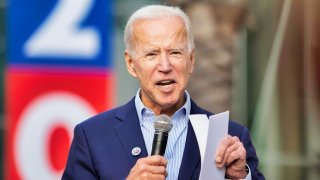Joe Biden Is Using Putin To Beat Donald Trump for the White House
President Joe Biden is using Putin as a cudgel to depict former President Donald Trump and his congressional supporters as weak and un-American. It amounts to a reversal of the cold war when Republicans regularly dinged Democrats for being soft on communism.
Don’t look now, but foreign policy is becoming a big part of the 2024 presidential race.
No, the campaign is unlikely to center on “It’s Russia, stupid,” but NATO and Russian President Vladimir Putin are playing an increasingly prominent role in the election.
President Biden is using Putin as a cudgel to depict former President Donald Trump and his congressional supporters as weak and un-American. It amounts to a reversal of the Cold War when Republicans regularly dinged Democrats for being soft on communism.
On Friday, Biden’s campaign team distributed an ad contending that Trump is a weakling in foreign affairs. “He’s even given Putin,” it stated, “the green light to attack America’s allies.” Biden himself assailed Trump, noting that “all of us should reject the dangerous statements made by the previous president that invited Russia to invade our NATO allies if they weren’t paying up.”
More fodder is being supplied by Tucker Carlson and others paying tribute to the greatness of Putin and Russia. Carlson was wowed by the fact that grocery prices were lower in Moscow than in America. But Russians also earn a lot less money than Americans. As Fareed Zakaria observed, “Carlson should go shopping in Mexico, where his groceries would also be much cheaper. Perhaps he will gain newfound respect for the Mexican government.”
Rep. Clay Higgins sees Putin as an admirable strongman. “Putin is a studied man of resolute spirit, and he always comes across as very sincere in his beliefs,” Higgins said. “You come away from a conversation with him thinking ‘I may not believe what he says, but I know he believes what he says.’” This faction constitutes a new version of the political pilgrims—aping their credulous forebears from the 1930s, when a variety of Western intellectuals, from Lincoln Steffens to George Bernard Shaw, visited Stalin’s Soviet Union to praise it as the future that works.
Another, older wing of the Republican party, however, is seeking to uphold its opposition to dictatorship abroad. Former vice-president Mike Pence, for example, wrote on “X” yesterday that “There is no room in the Republican party for apologists for Putin, RIP Alexey Navalny.” The Republican hawks managed to pass a bill aiding Ukraine in the Senate, but they have been stymied in the House, where Trump is in close contact with House Speaker Mike Johnson. So far, Johnson is refusing to bring the bill to the floor of the House. The House remains in recess until February 28.
Meanwhile, the Biden administration continues to go on the offensive. At the Wehrkunde conference in Munich, vice-president Kamala Harris directly targeted Trump. “Isolation is not insulation,” she said. “In fact, when America has isolated herself, threats have only grown. In these unsettled times it is clear America cannot retreat. America must stand strong for democracy. We must stand in defense of international rules and norms and we must stand with our allies.”
At a moment when Putin is emboldened, her remarks may represent a triumph of hope over reality. Putin’s murder of Navalny is being widely interpreted as a gesture of contempt toward the West. Coupled with his advances in Ukraine—most notably in the city of Avdiivka—Putin appears to be entrenching his rule, particularly as the March presidential elections near. As Biden and Trump clash over America’s role abroad, Putin is benefitting.
About the Author: Jacob Heilbrunn
Jacob Heilbrunn is editor of The National Interest and is a nonresident senior fellow at the Atlantic Council’s Eurasia Center. He has written on both foreign and domestic issues for numerous publications, including The New York Times, The Washington Post, The Wall Street Journal, Financial Times, Foreign Affairs, Reuters, Washington Monthly, and The Weekly Standard. He has also written for German publications such as Cicero, Frankfurter Allgemeine Zeitung, and Der Tagesspiegel. In 2008, his book They Knew They Were Right: the Rise of the Neocons was published by Doubleday. It was named one of the one hundred notable books of the year by The New York Times. He is the author of America Last: The Right’s Century-Long Romance with Foreign Dictators, coming soon.
Image Credit: Shutterstock.


